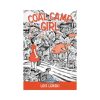Your bag is empty
Don't miss out on great deals! Start shopping or Sign in to view products added.
Shop What's New Sign in$14.95
Available in stock
But the mine whistle could mean other things in the lives of the miners and their families. Sometimes it was the signal for disaster. And sometimes it did not blow at all, when the mines were closed and there was no work for the men. Tina and her brother and their friends learned some hard lessons about hunger and hardship that winter; but they also learned about hope and courage. And, of course, there were lots of happy times, too: square dances, a wedding, and rides on Grandpa’s ponies.
As in all Lois Lenski’s regional books, the events in this story are based on true happenings, so her picture of life in a “coal camp” is a true snapshot of the 1950s. Written in 1959.
| Weight | .4 kg |
|---|---|
| Dimensions | 9 × 6 × .4 in |
| ISBN | 9781948959537 |
| Author | Lois Lenski |
| Publisher | Purple House Press |
| Format | Paperback |
